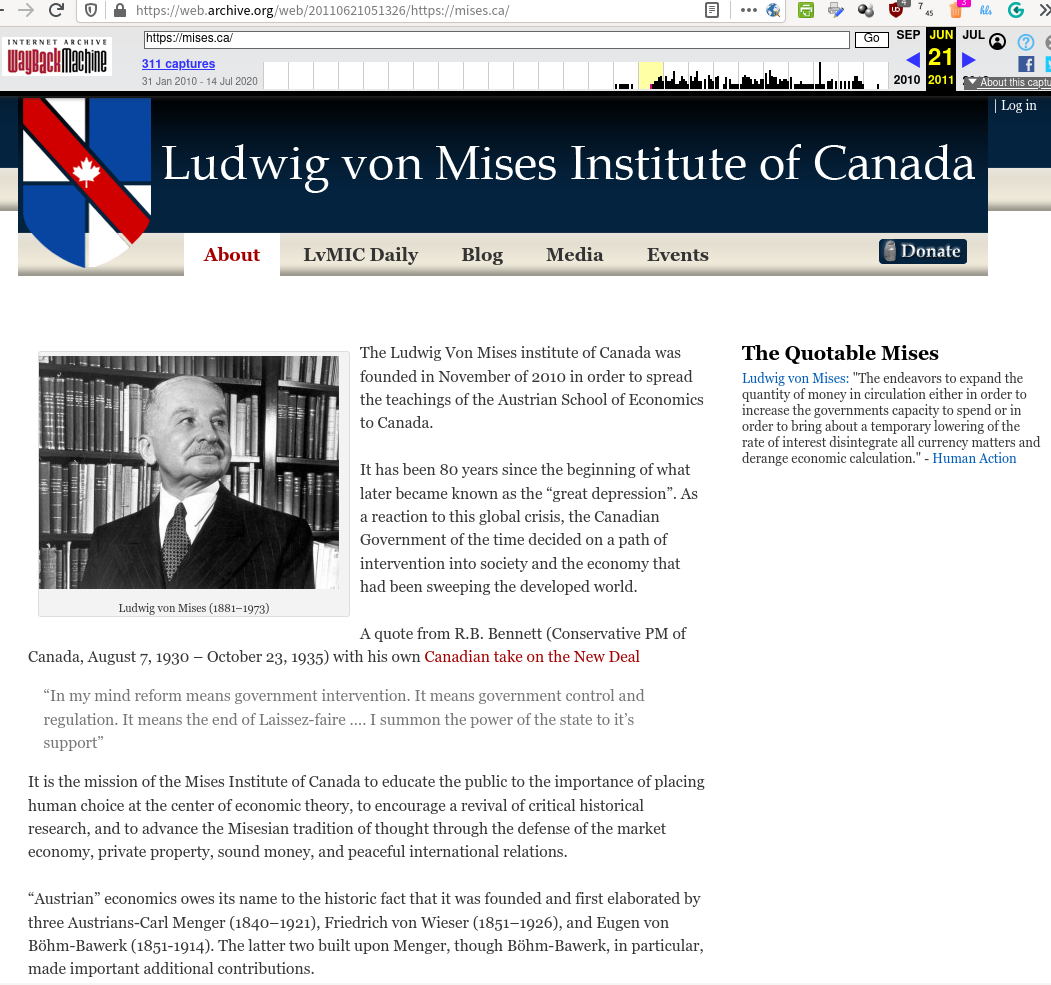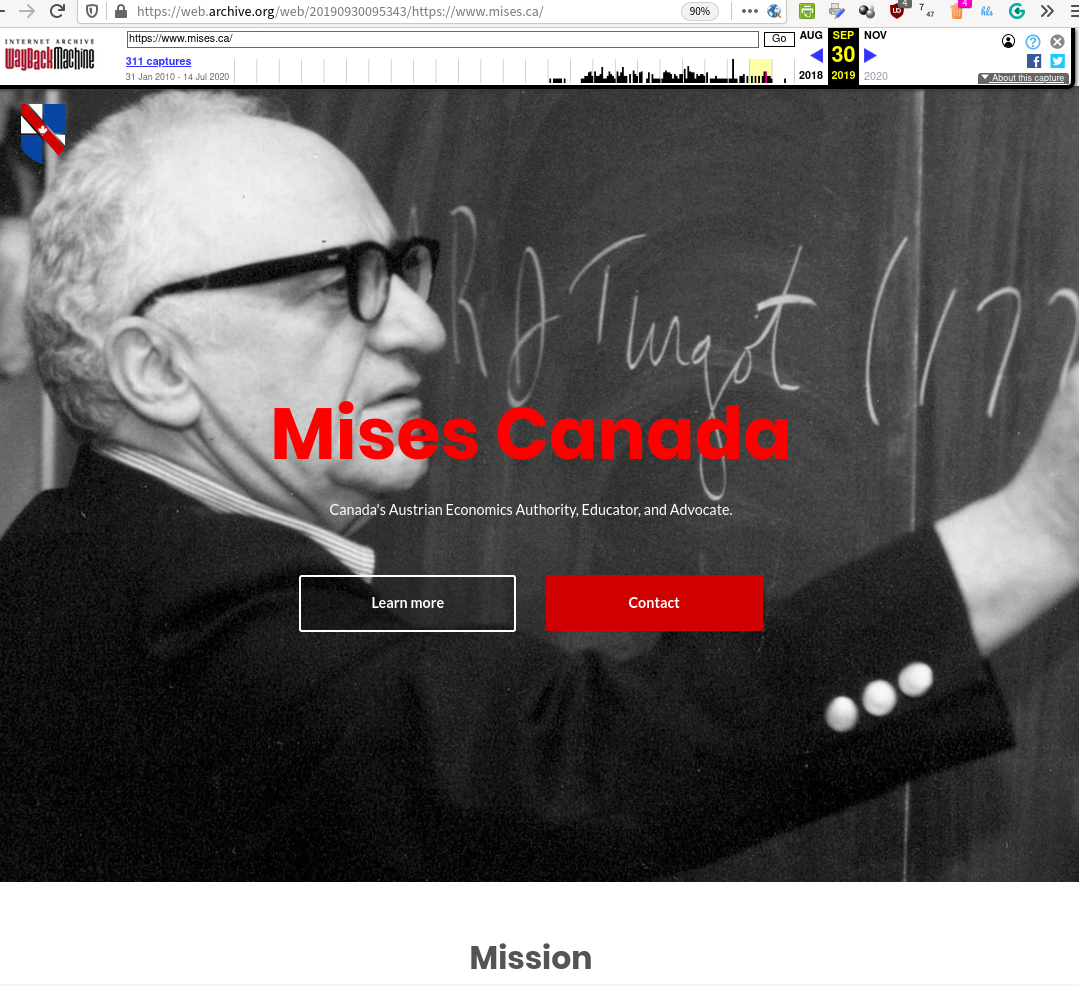See also: Ludwig von Mises Institute of Canada

Burton Blumert, Llewellyn Rockwell, David Gordon, and Murray Rothbard.
[Image source. Click image to open in new window.]
History
The Ludwig von Mises Institute for Austrian Economics, or Mises Institute, is a nonprofit think-tank located in Auburn, Alabama, United States. It is named after Austrian School economist Ludwig von Mises (1881-1973).
The Mises Institute was founded in 1982 by Lew Rockwell, Burton Blumert, and Murray Rothbard following a split between the Cato Institute and Murray Rothbard, who had been one of the founders of the Cato Institute.
The Mises Institute was funded by Ron Paul, a Senior Fellow of the Mises Institute. Ron Paul regularly voted against almost all proposals for new government spending, initiatives, or taxes; he cast two thirds of all the lone negative votes in the House during a 1995–1997 period. Ron Paul pledged never to raise taxes[156] and states he has never voted to approve a budget deficit. Paul believes that the country could abolish the individual income tax by scaling back federal spending to its fiscal year 2000 levels;[157][158] financing government operations would be primarily by excise taxes and non-protectionist tariffs. He endorses eliminating most federal government agencies, terming them unnecessary bureaucracies. ... [Source: Wikipedia.]
Background and location
Further information: Split among the contemporary Austrian School
The Ludwig von Mises Institute was established in 1982 in the wake of a dispute which occurred in the early 1980s between Murray Rothbard and the Cato Institute, another libertarian organization co-founded by Rothbard.
Early after its founding, the Mises Institute was located at the business department offices of Auburn University, and relocated nearby to its current site in 1998. "Southerners have always been distrustful of government," making the South a "natural home" for the organization's libertarian outlook.
Views espoused by founders and organization scholars
In a 2006 article published on the Wall Street Journal's website, Kyle Wingfield credited the Mises Institute for helping make the "Heart of Dixie a wellspring of sensible economic thinking."
The Mises Institute is founded in Misesian praxeology ('the logic of action'), that holds that economic science is a deductive science rather than an empirical science. Developed by Ludwig von Mises, following the Methodenstreit opened by Carl Menger, it is a self-conscious opposition to the mathematical modeling and hypothesis-testing used to justify knowledge in neoclassical economics. Externally, this economic method usually is considered a form of heterodox economics.
American Civil War and the Confederacy
A 2000 "Intelligence Report" by the Southern Poverty Law Center, categorized the Mises Institute as Neo-Confederate, "devoted to a radical libertarian view of government and economics."
Publications, conferences, activities and awards
The Mises Institute makes available a large number of books, journal articles, and other writings online, and archives various writings on its website. Its Quarterly Journal of Austrian Economics discusses Austrian economics. It published the Journal of Libertarian Studies from 1977 to 2008.
Notable scholars
Noted scholars include:
-
Walter Block -- Austrian School economist and anarcho-capitalist; economics professor at Loyola University New Orleans
-
Thomas DiLorenzo -- economics professor at Loyola University Maryland
-
Paul Gottfried -- Former Professor of Humanities at Elizabethtown College
-
Hans-Hermann Hoppe -- philosopher, paleolibertarian [a political philosophy and variety of right-libertarianism developed by American anarcho-capitalist theorists Murray Rothbard and Lew Rockwell that combines traditional conservative cultural values and social philosophy with a libertarian opposition to government intervention], business professor at University of Nevada, Las Vegas, and founder of Property and Freedom Society
-
Jesus Huerta de Soto -- Professor of Applied Economics at King Juan Carlos University
-
Peter Klein -- Professor of Entrepreneurship and Senior Research Fellow with the Center for Entrepreneurship & Free Enterprise at Baylor University
-
Robert P. Murphy -- economist, Institute for Energy Research
-
Andrew Napolitano -- Fox News pundit and former judge
-
Gary North -- co-founder of Christian Reconstructionism and founder of Institute for Christian economics
-
Ron Paul -- physician, author, and former congressman
-
Ralph Raico (1936-2016) -- historian and libertarian specializing in European classical liberalism and Austrian economics
-
Murray Rothbard (1926-1995) -- heterodox economist, paleolibertarian theorist, polemicist, revisionist historian, and founder of anarcho-capitalism
-
Joseph Sobran (1946-2010) -- journalist, contributor to American Renaissance and lecturer at the Institute for Historical Review
-
Mark Thornton -- Austrian School economist
-
Joseph T. Salerno -- Academic vice president of the Mises Institute, professor of economics at Pace University, and editor of the Quarterly Journal of Austrian Economics.
-
Thomas Woods -- historian, political analyst, and author
Criticisms
The Mises Institute has been criticized by some libertarians for the adoption of paleolibertarian [a political philosophy and variety of right-libertarianism developed by American anarcho-capitalist theorists Murray Rothbard and Lew Rockwell that combines traditional conservative cultural values and social philosophy with a libertarian opposition to government intervention] and right-wing cultural views by some of its leading figures, on topics such as race, immigration, and the presidential campaign of Donald Trump.
In 2003, Chip Berlet of the Southern Poverty Law Center (SPLC), an American nonprofit legal advocacy organization specializing in civil rights and public interest litigation, described the Mises Institute as "a major center promoting libertarian political theory and the Austrian School of free market economics," also noting Rothbard's opposition to child labor laws and the anti-immigrant views of other Mises Institute scholars.
Ludwig von Mises Institute of Canada



